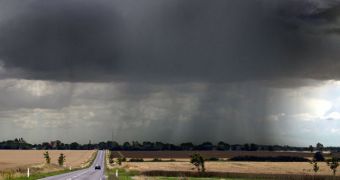Climate scientists propose a new geoengineering scheme which, if successful, could ensure that the planet is sufficiently cooled to avoid catastrophic consequences. The method is entirely natural so to speak, in the sense that it makes use of a mechanism already set in place by nature.
In short, experts want to use Earth's sulfur cycle to cool the planet. This can be done thanks to discoveries made in a recent investigation. Experts were finally able to determine how the two main components of the sulfur cycle function.
In past studies, experts determined that bacterioplankton in the world's oceans – the bacterial component of plankton drifting in the water – produces sulfur compounds, which are either sent to the atmosphere, or recycled in the ocean.
In the first pathway, the chemicals go airborne, and, once they reach the upper atmosphere, provide the seeds for massive clouds, that help cool the planet. In their secondary use, the compounds are consumed by the oceanic food web, and are returned to the seawater.
What experts are now proposing is using the first branch of the natural sulfur cycle, while forcing the second one in the background. Until now, experts had no idea why sulfur took one of the two ways over the others, and how, but the new study reveals these information, and more.
“With our increased understanding of the sulfur cycle in the ocean, we are now better able to evaluate the impacts of climate change on the process and the potential for its manipulation, which has been proposed as a way to mitigate global warming,” explains study coauthor William Whitman.
The new investigation was carried out by a team of investigators at the University of Georgia, in the United States, and details of the work appear in the latest issue of the top scientific journal Nature.
“It’s wonderful to have this much understanding of a major biogeochemical process. The big mystery about bacteria is what they are doing in nature,” the expert says.
Whitman also holds an appointment as a distinguished research professor at the university, and as the head of the Franklin College of Arts and Sciences Department of Microbiology, Science Blog reports.
“The organisms metabolize compounds for their own needs. We need to understand what they are getting out of it to understand what it means for the ocean, and now it will be possible to look at the environmental importance of this process and how it’s regulated.” he adds.
The new research was made possible by funds secured from the US National Science Foundation (NSF) and the Gordon and Betty Moore Foundation.

 14 DAY TRIAL //
14 DAY TRIAL //